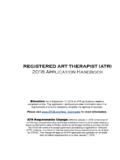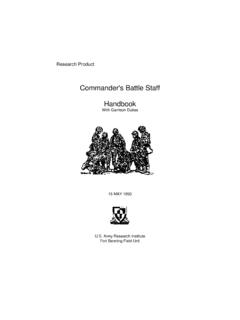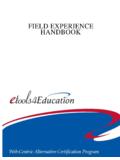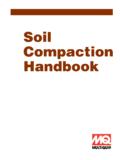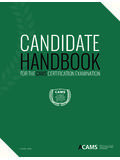Transcription of REGISTERED ART THERAPIST (ATR) 2018 Application Handbook
1 REGISTERED ART THERAPIST (ATR) 2018 Application HandbookAttention: As of September 15, 2016 all ATR applications must be completed online. This Application Handbook provides information about the requirements and forms needed to complete the Application visit for more Requirements Change: Effective January 1, 2018, a minimum ofhalf the required post-education art therapy experience hours must be supervised by a board certified art THERAPIST (ATR-BC) and/or an art therapy certified supervisor (ATCS). The ATCB will continue to accept supervision provided by a REGISTERED art THERAPIST (ATR); however, a minimum of half the supervision hours must be provided by at least an ATR-BC.
2 This change will apply to all ATR applicants who graduate (or complete their education requirements) on or after January 1, 2018. This Application is for individuals who: are graduates of AATA-approved or CAAHEP-accredited art therapy education programs, OR are graduates of art therapy education programs not approved by AATA or accredited by CAAHEP, OR hold a master s or higher degree in a related mental health field and who completed additional art therapycoursework, AND meet the education requirements for the must meet the ATR requirements in place at the time of their date of graduation unless they apply for registration more than seven years after graduation, in which case they must meet the standards in place at the time of their Application .
3 Table of ContentsREGISTERED ART THERAPIST (ATR) 2018 Application HandbookInformation and InstructionsEducation Requirements for the ATR .. 1 - 2 Post-Education Supervised Art Therapy Experience Requirements .. 3 - 4 Reference Requirements .. 4 Information About Applying .. 5(Completing the Application , The Application Process)Maintaining the ATR .. 6 Applying for Board Certification (ATR-BC) .. 6 FormsVerification of Coursework Form .. 7 - 9 Verification of Practicum/Internship Form .. 10 - 11 Verification of Post-education Experience Forms .. 12(for ATR/ATR-BC/ATCS Supervisors)Verification of Post-education Experience Forms .. 13(for non-ATR/ATR-BC/ATCS Supervisors)Reference Form.
4 14 - 15 ATR Application Checklist .. 16 The mission of the Art Therapy Credentials Board, Inc. (ATCB) is to protect the public by promoting the competent and ethical practice of art therapy through the credentialing of art therapy master s or higher degree from a program approved by AATA or accredited by CAAHEP at the time ofgraduation. If the program is no longer approved, the applicant is responsible for obtaining verification of pastapproval directly from AATA or CAAHEP, and submitting that verification along with the Application who do not hold a master s or higher degree from a program approved by AATA or accredited byCAAHEP at the time of graduation must meet the education requirements as outlined coursework must have earned credit from a college or university approved by a national or regional accrediting agency.
5 An overall grade point average (GPA) of or higher is required for all coursework counted towards the Requirement for Application for the ATR: A master s or higher degree with coursework in the following areas is recommended: human growth and development, theories of counseling/psychotherapy, psychopathology/abnormal psychology, psychological assessment, research, and field experience in a clinical setting. If an applicant does not have such a specific master s or higher degree, they must have still earned a master s or higher degree, and will still be responsible for collecting all of the listed mental health coursework and field experience prerequisites at the graduate level.
6 Studio Art Content Requirements: Education Requirements for the ATR Eighteen (18) semester credits (or 27 quarter credits) instudio based art courses. Studio art coursework can be at the graduate orundergraduate level. Applicants must have successfully completed courseworkin a variety of two- and three-dimensional art media(which may include digital art) and processes. At least 12 credit hours must be completed prior tobeginning the art therapy coursework. The remaining six(6)hours may be completed after beginning the first arttherapy course that will count toward this credential, butmust be completed within a year of beginning graduatecoursework in art therapy. Studio based courses taken within an art therapy program donot satisfy the prerequisite studio art courses.
7 In lieu of academic based studio coursework, the ATCB willaccept up to six (6) credits from a portfolio demonstratingcompetency, provided the applicant obtains a letter from a full-time or pro rata faculty member who has current ATR-BC orATCS status and who teaches in a program that is within aregionally or nationally accredited institution of highereducation, and who has reviewed the portfolio and is willing toattest that the applicant has demonstrated such may also use non-credit art instruction (see p 8).Mental Health Content Requirement: A minimum of three (3) graduate semester credits [or four (4) quarter credits] in each of the following six (6) areas. If the master s or higher degree did not include coursework in all required areas, up to two courses may have been completed independent of the graduate program, provided they earned graduate credit at a nationally or regionally accredited college or university.
8 Official transcripts are required for all coursework applied to the ATR requirements. If content is covered in the context of an art therapy graduate program, this must be demonstrated through course descriptions or syllabi detailing course content. Psychopathology/Abnormal Psychology:* Criteria of psychiatric diagnoses, biopsychosocial factors, and level offunctioning; theories of psychopathology; ability to recognize indicators of functional and organic disorders inclients; basic knowledge of types of psychopharmacological medications. Psychological Assessment:* Historical perspectives of assessment, basic concepts of standardized andnonstandardized testing and assessment, fundamentals of psychological testing, biopsychosocial assessment,statistical concepts including reliability and validity, strategies for selection of the assessment tools, and familiaritywith a variety of specific instruments and procedures used in appraisal and evaluation.
9 *Course descriptions/syllabi must demonstrate coverage of DSM diagnostic criteria in use at the time the course wassuccessfully Requirements - continued on the next pageATR Application Handbook (effective January 1, 2018)PAGE 2 Human Growth and Development: Human psychological development across the life span, theories ofpersonality development, cultural and environmental influences. Familiarity with human behavior, includingdevelopmental crises, disability, exceptional behavior, and addictive behavior. Counseling/Psychological Theories: Historical development of counseling and psychological theories,understanding of systems perspective, Application to case material, and interviewing and counseling skills.
10 Research: Basic tenets of planning, conducting, and evaluating research and understanding researchmethodology, to include qualitative and quantitative designs. The importance of research in the psychotherapyprofessions, ethical, practical, and legal considerations, and the use of research to assess effectiveness of mentalhealth services. field Experience: Clinical field experience providing counseling/psychotherapeutic services under supervision andcompleted for graduate credit. This requirement can be waived if the applicant is a graduate of an art therapygraduate program and completed art therapy field experience meeting the ATR Therapy Core Content Requirement: A minimum of 24 graduate semester credits (or 36 quarter credits) in art therapy core curriculum (not including credits earned for practicum/internship or studio art) that substantially cover the content in the nine (9) areas listed below.
